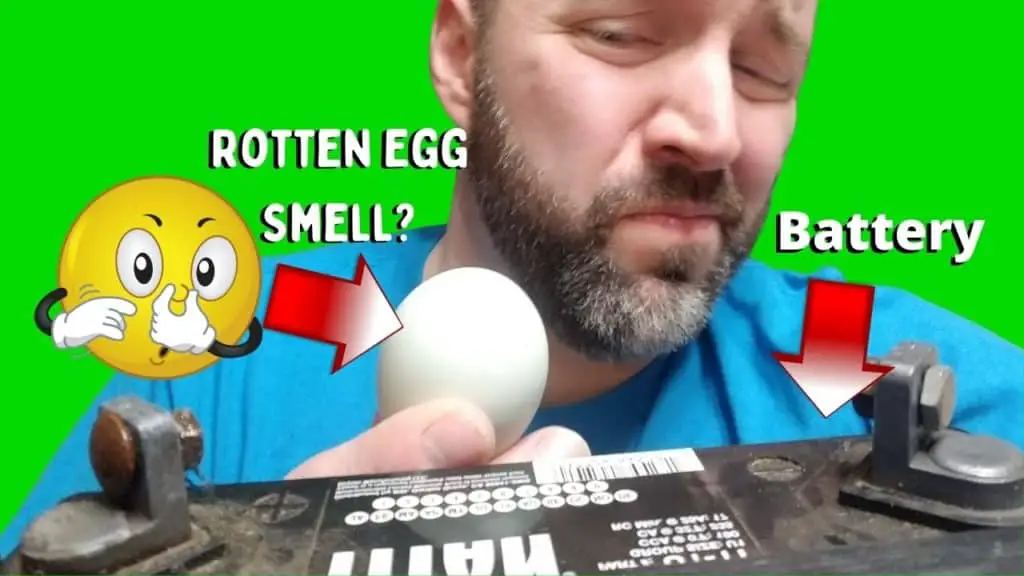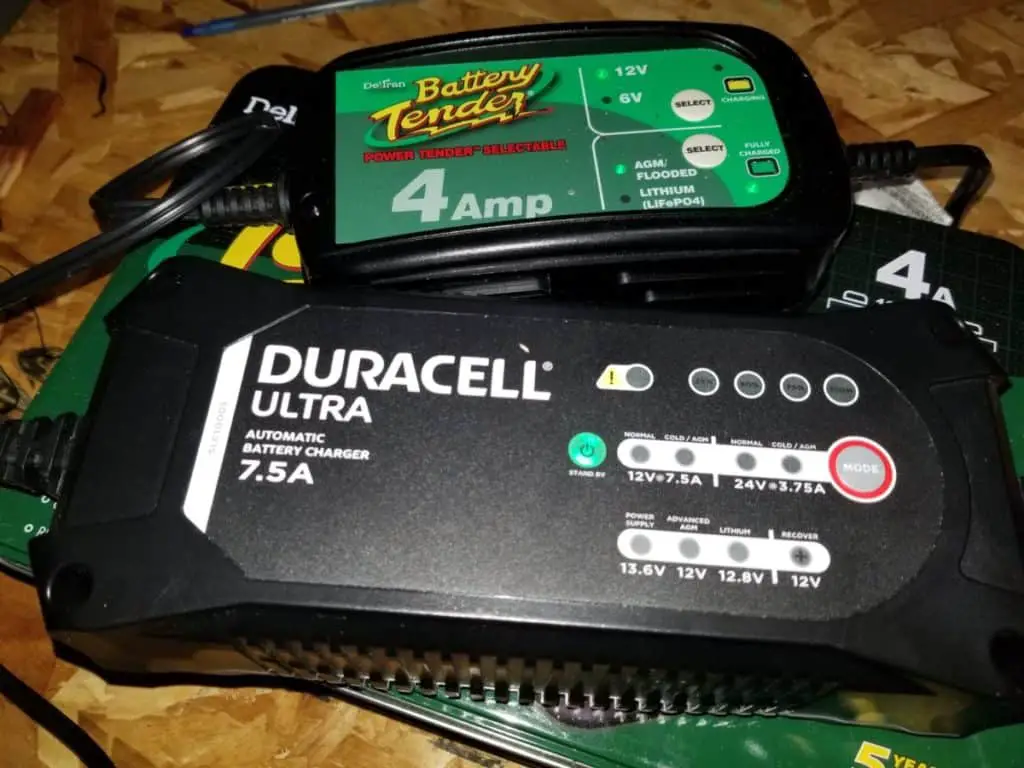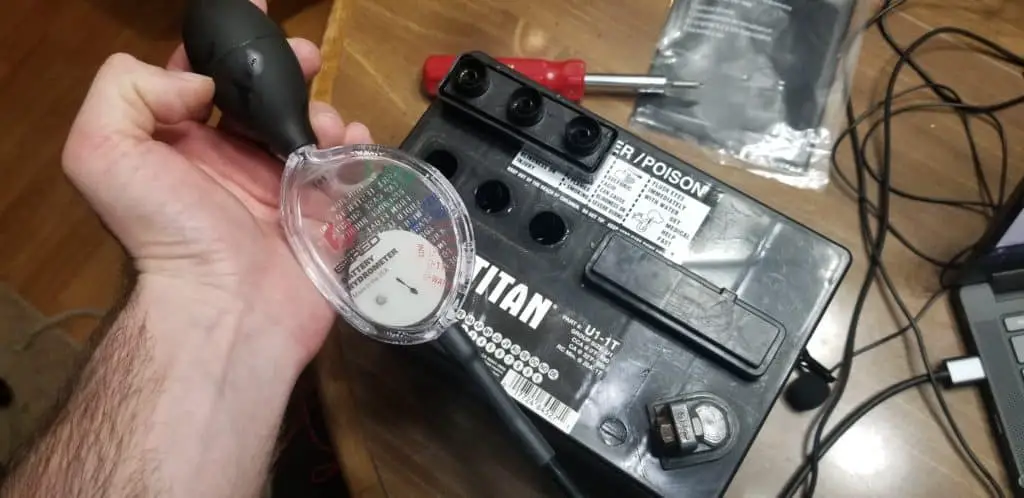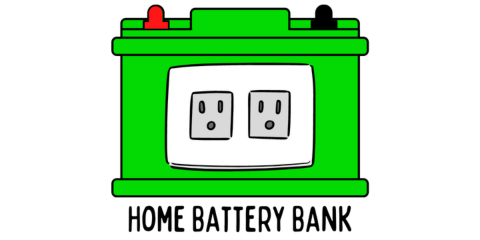Let me guess. You hooked up your 12-volt battery to a charger that you had stashed away in your garage and within the hour you smelled nothing but the stench of rotten eggs?
Yes, we’ve all been there before when charging a 12-volt, or other lead acid battery. Car batteries, golf cart batteries, marine batteries, forklift batteries, lawn mower batteries — they are all capable of smelling like a hidden Easter egg that was never found.
Why exactly is your car battery or other lead acid battery smelling like rotten eggs?
As a general rule, the rotten egg smell that comes from a battery is the gas hydrogen sulfide and is due to a battery being overcharged. This can cause throat and sinus irritation or even be lethal in high enough concentrations. An over-sized charger is the most common culprit for this smell.
⬇⬇⬇Here are the top 5 reasons why your battery might be smelling like rotten eggs⬇⬇⬇
| Reason for Rotten Egg Smell | Why it’s Happening | What to Do |
|---|---|---|
| Over-sized charger for the battery | Current passing through the battery exceeds the battery’s ability to convert it, heat and gasses released | Replace charger with one with lower amps, 10% amp rule |
| Charger in Equalization Mode | Charger is purposefully increasing the voltage which is a controlled overcharge, heat and gasses released | Switch to a charger without this feature (or has to be toggled manually) or make sure your battery is in a well ventilated area if you are going to use it |
| Charger is Defective | Current passing through the battery exceeds the battery’s ability to convert it, heat and gasses released | Replace charger |
| Using an Old Charger that Is NOT Microprocessor Controlled | Current passing through the battery exceeds the battery’s ability to convert it especially in the later stages of charging and after battery is at 100% charged, heat and gasses released | Set a timer or upgrade to a modern microprocessor-controlled, 3 or 4 stage smart charger |
| Internal Short in the Battery or a Bad Cell | Lead plates are shorting out in the battery causing excess heat during use, charging, or even just sitting there, heat and gasses released | Test each battery cell to check the specific gravity on a flooded battery, if one or more is bad, replace the battery |
Why Is My Battery Smelling Like Rotten Eggs?
When overcharging, a battery will smell like rotten eggs as liquid sulfuric acid (H₂SO₄) is broken down by the excess electrical current and hydrogen sulfide (H₂S) is released. Hydrogen sulfide has the distinct smell of rotten eggs or sulfer.
Typically this is all due to either too much amperage going into the battery (an over-sized charger), or too much voltage (the charger is in equalization mode). It can, however, happen when there is an internal short, a malfunctioning battery, or if the charger you’re using is old and not microprocessor controlled.
These older chargers just pump out current and do not monitor how much the battery can accept at any given time or even if the battery is fully charged.
Basically, batteries convert electrical energy from your charger into stored chemical energy.
The amount of electrical energy that your battery convert is determined by the state of charge of your battery in this moment now.
It’s basically like the law if diminishing returns.
If your battery is at 20%, it can accept and convert current like crazy until it gets to about 80%. Then its ability to convert slows down until about 90% where it slows down even more.
The closer your battery gets to being fully charged, the more difficult it is to actually charge it.

It’s like blowing up a balloon to maximum capacity WITHOUT popping it. You can fill the first 80% easily. Then you slow down, and slow down even more as you approach 100%. Plus, the balloon is now pushing air back at you. In the battery’s case, this would be increased internal resistance as it charges.
If you exceed the rate at which the battery can convert electrical energy into stored chemical energy, then the battery MUST do something with the excess electricity.
This is where electrolysis occurs. Excess electricity that cannot be converted is actually destroying your water and sulfuric acid molecules in your electrolyte and heat is generated.
This heat causes evaporation.
Evaporation releases water vapor and hydrogen sulfide, which is when you smell the rotten eggs.
If the overcharge is minimal and you have a sealed lead-acid battery, then you will likely not even notice a problem since everything will be recombined. Flooded lead-acid batteries are way easier to tell if there’s an overcharge issue.
Still, even sealed batteries have a pressure relief valve if the overcharge is too much and you can still smell the rotten egg smell on them.
Is the Rotten Egg Smell from a Battery Dangerous?
The rotten egg smell from a battery is dangerous in high enough concentrations and with inadequate ventilation. The rotten egg smell is caused by the gas hydrogen sulfide and can cause severe irritation to the throat and sinuses, and even be deadly if it is concentrated highly enough and there is improper ventilation.
When I was new to battery banks and was building my own, I was using a charger that was over-sized for my particular setup. This was causing excess heat and hydrogen sulfide to be released.
Unfortunately you go “nose-blind” from it after a short while and I was in my basement researching what to do and to see if it was normal for about 20 minutes or so before I finally unplugged everything and got fresh air.
My throat and the inside of my sinuses felt absolutely raw for days afterwards.
5 Common Reasons that Cause Your Battery to Overheat and Smell Like Rotten Eggs
Over-sized Charger
If your charger is over-sized, you will want to buy a new charger.
It’s a good rule of thumb to follow the 10% rule.
Buy a charger that has an amp rating that is 10% or less of your battery’s total amp hour (AH) rating.
So, for instance, a 50AH battery would need a 5amp charger.
An over-sized charger will provide more amps than the battery can convert, and the result will be excess heat and the rotten egg smell through the electrolyte evaporating out.
From my experience, you can sometimes get away with a charger that has an amp rating that is 15-20% of the battery’s total AH rating, but the 10% rule is good to live by.
If your battery is an SLA, or starting battery (car, lawn tractor, etc.), and does not have an AH rating, you can go to my other article here where I have calculators that you can access that will give you ballpark estimates. If you get different numbers from different calculators, just be conservative and average them out.

Desulfation Mode
If your battery charger is in equalization/maintenance/desulfation mode, then the smell of rotten eggs is actually normal.
During desulfation mode, a charger is doing a “controlled overcharge” of your battery by increasing the voltage to 16+ in order to dislodge any lead sulfate crystals which have started covering the lead plates in your battery.
Some chargers do this automatically, some have a button that you must push, and some have proprietary technology that desulfates during the normal charging process.
I prefer a charger that will NOT desulfate my battery automatically since I want to be aware of when it is going to be emitting a harmful gas.
I highly recommend Deltran Battery chargers for your charging needs. I’ve been using their products daily for 7 years without an issue, and without the rotten egg smell. They provide a gentle charge, keep your battery desulfated during the charging and float modes WITHOUT the large voltage spikes that cause the smell of rotten eggs.
⬇⬇⬇ My preferred models are below for your particular battery. ⬇⬇⬇
| Battery Application | Recommended “Trickle Charger” Amp Range | Recommended “Trickle Chargers” (Amazon) |
|---|---|---|
| Car | 2-4 Amps | 2-Amp Noco Genius® 4-Amp Battery Tender® |
| Boat (Marine) | 2-5 Amps | 4-Amp Battery Tender® 5-Amp Noco Genius® |
| Lawn Tractor, Motorcycle, ATV | 750mA – 1.25 Amps | 750mA Battery Tender® 1.25-Amp Battery Tender® (12 or 6 volts) 2-Amp Noco Genius® |
| Golf Cart (6-Volt) | 2-4 Amps | 2-Bank, 4-Amp (2 per bank) 6 or 12 Volt Noco Genius® You can hook up 2 x 6 volt batteries on each bank, or use the 12-volt setting if you have 2 x 6-volt batteries hooked in series 4-Amp Battery Tender® |
Charger Malfunctioning
If you suspect that your charger is acting funny, the only practical option is to trash it and purchase a new charger. Any of the models listed above would be excellent choices!
Charger Not Microprocessor Controlled
Chargers from decades ago were not microprocessor controlled. They basically emitted a set current at a set voltage and didn’t care about what the battery could or couldn’t accept and convert.
If the battery was 100% charged, the charger kept pumping the current.
This would, of course, result in the battery overcharging and heat would generate which would release hydrogen sulfide and make you smell the rotten eggs.
Any charger on the market today is going to be a microprocessor controlled, 3 or 4 stage charger and they should all monitor what the battery can accept and convert, and they will enter into a “float mode” when the battery is fully charged.

Internal Short or Bad Cell
If you have an internal short in your battery, then you have lead plates that are touching each other inside the battery when they should actually be separated by electrolyte.
This can happen after an accident, dropping the battery, or jarring it violently in some way.
Once this happens, your battery will generate excess heat during charging, during use, and sometimes just by sitting there.
If you have a bad cell, for whatever reason, then you can also have problems even with a correctly-sized charger as far as overcharging.
A smart charger should recognize that a battery has a bad cell but it might take it a little bit to figure out. In the meantime, you might be smelling that rotten egg stench.
A 12-volt battery, for instance, is fully charged at about 12.65 volts. Each cell (there are 6) should be about 2.1 volts (give or take).
The goal of the battery charger is to bring the TOTAL voltage of the battery up to 12.65 volts. If there is a defective cell that is, let’s say, 1.25 volts, then the other cells will be overcharged to compensate for the bad one that won’t hold a charge.
The battery could still read 12.65 (temporarily) and appear fully charged, but the 5 cells would have a higher charge than ideal in order to accomplish that and pick up the slack for the defective cell.
While these 5 cells are being overcharged, they will be emitting hydrogen sulfide gas as heat is released from the excess electricity.
The only option here is to check the specific gravity in each of your cells with a hydrometer and see if you have a bad cell. This can only be done with a flooded battery where you can pop the caps off, not a sealed battery.
If a cell or more than one are bad, then you will need to replace the battery.

What Should I Do When My Battery Smells Like Rotten Eggs?
It is best to check the voltage with a voltmeter or multimeter when your battery smells like rotten eggs, and then to unplug it afterward.
The voltage might give you an indication as to what was happening. If your voltage was 14.5 or so, then there’s a good chance that your amperage is too high with your charger and you need to use a charger with fewer amps.
If your voltage is high 15 or 16+, then there is a good chance that your charger was in the desulfation/equalization/maintenance mode and is conducting a “controlled overcharge”. This, depending on the manufacturer of the charger, could take 4-10 hours.
If you are not impressed with your charger conducting an automatic desulfation mode, then I recommend checking out the links to the chargers in the table above.
If you have a flooded battery, keep track of your electrolyte levels and carefully add distilled water as needed. The level should be about 1/8″ to 1/4″ below the bottom of the fill tubes.
If you have a sealed battery, you cannot replace any electrolyte that is lost through evaporation. Low grade overcharges won’t harm the battery much since it can recombine the electrolyte (it’s sealed — to a point), but if you’re able to smell rotten eggs from a sealed battery then you have exceeded the battery’s pressure tolerances and it is now off-gassing due to the heat buildup.
Like I said, any evaporated gasses cannot be put back in. Be especially careful with sealed batteries and overcharging.
How Do I Prevent My Battery from Smelling Like Rotten Eggs in the Future?
The easiest way to keep a battery from smelling like rotten eggs is to use a properly sized charger, do not desulfate your battery, and to use a modern 3 or 4-stage smart charger.
